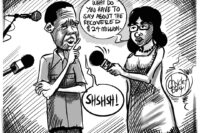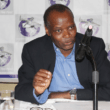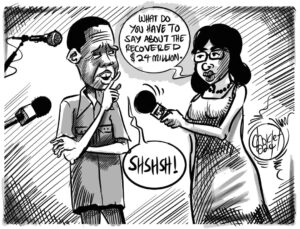DIRECTOR of Public Prosecutions (DPP) Lillian Siyunyi State Counsel says prosecuting corruption cases can be a complex task, explaining that “sometimes there can be no evidence but it is in public interest to prosecute”.
And Siyunyi has explained that the case of Amos Chanda and others has not finished as her office could be looking for alternative charges and other evidence, adding that in the case of Tourism Minister Ronald Chitotela, there was no basis at law to appeal the acquittal.
Meanwhile, Deputy DPP Nkumbiza Mumba has revealed that the National Prosecutions Authority (NPA) attended to 36,765 cases before different courts of law in 2019, out of which 21,296 convictions and 1,434 acquittals were recorded.
In an exclusive interview with News Diggers!, State Counsel Siyunyi said the DPP’s office cannot appeal a court judgement on a point of fact following what a witness said in court, but on a point of law guided by how the matter was concluded.
Asked if she was satisfied with the outcome of the Chanda and Chitotela cases, Siyunyi said the two cases were different in terms of how they satisfied the conditions for prosecution, adding that sometimes, there can be evidence but it could not be in public interest to prosecute.
“Well, in the Amos Chanda case, there was no judgment. But if it is the Chitotela case that you are talking about, the reasons for his arrest and the proof was proper at the time. After the Chitotela case was perused, it was found that there was sufficient evidence on which the prosecution could go on, that’s why we took the case to court. So at that time, because when you receive, you read because there are two conditions in order to satisfy a case; is there sufficient evidence to want a conviction? Yes. Is it in public interest? Yes. Sometimes there can be evidence but it’s not in the public interest to prosecute. Sometimes, there can be no evidence but it’s in the public interest to prosecute. But the two conditions ought to be satisfied, they are mutual. So at that time, yes according to our understanding of the matter, yes there was [evidence]. But what happens in court is something different which may render that we shouldn’t appeal,” Siyunyi said during an interview at her office, Tuesday.
“You may wish to note that the DPP cannot appeal on a point of fact, the DPP only appeals on a point of law. Then what happens after a judgment is given? What we look at is not what the witness has said in court, but the conclusion that the court reached. Is there a basis at law where we can say the judge was wrong in acquitting? So that’s the point of law; were legal procedures not followed in the conduct of this case? If it’s found that the legal procedures were not followed, then that’s the time the DPP can appeal. The DPP cannot appeal on what a witness said because that’s a matter of fact.”
Asked to categorically state if she was satisfied with the Chitotela acquittal, she said: “There are no questions…that arose from the judgment of the court.”
“One of the cases you referred to in your query was the Chitotela case which has been adjudicated on. So for this case, other than the witness statements that were given, they also got statements from places like [Ministry of] Lands to confirm ownership of the properties that were in issue, when it was bought and the like. And then there would also be likely bank records to see how much money comes into these people’s accounts and how much is going out. So those are the things that were contained in his docket. So it’s on the basis of the evidence that is in the docket that a decision is made,” Siyunyi said.
Asked to explain what transpired for the case of Chanda and others to be stopped, she said her office was not yet done with the matter.
“The Amos Chanda case has not finished. Maybe we are actually looking for alternative charges, for other evidence. So, it’s not concluded. We can take it back even in 2022 or 2023, even 2026,” Siyunyi said.
She explained that she did not personally read all dockets that were referred to her office and it was inconceivable to imagine that she could decide whether certain high profile cases should be prosecuted or not.
“Dockets don’t only come to the DPP’s office, they first goe to the registry and then they will bring them to the DPP’s office. Even if I am not there, my deputy will be there. But if she isn’t at the office either, she will assign someone else to look at that docket. So we don’t get specific phone calls from anywhere among the law enforcement agencies to say ‘there is this docket that’s coming for politician B’, no. Everything goes through the right channels, and once we get that docket, believe you me, I don’t read the records outrightly, I give them to people who will look at it, whether it’s a corruption case, GBV case and so on. So whenever a case comes [to this office], I just take note that this case has come and it’s recorded in the registry book and delivered to that department that later on renders an opinion to my office. When I get that opinion, that’s when I decide to go through, and it’s very rare that I argue with the people that have written an opinion,” Siyunyi explained.
“That politics aspect, I have never encountered it anyway. Maybe it’s unconscious bias, but it never happens because once someone writes an opinion, I would be able to say. And when it comes to corruption cases, other than the opinions here, we also get the opinions from the investigating agencies themselves. In particular, corruption cases are investigated by ACC and in most cases are prosecuted by ACC, they only come here for consent to prosecute. So there is the additional opinion that comes from ACC itself and then our officers here also review the opinion that was given together with the available evidence. It’s only after that is done when the consent to prosecute is given or not given.”
Asked to react to the statement from Chief Government spokesperson Dora Siliya who challenged the DPP to explain how much money was being wasted through fighting political corruption, the State Counsel wondered what price tag could be placed on getting justice.
“When you say political corruption, which cases in particular? Because if you just say one, or two or three cases, how are we going to know? I think the goal of taking a case to court, there are so many reasons why you take a case to court. Sometimes you seek retribution. It’s like defilement, you want justice for this child who has been defiled. So, what price tag can you place on getting that justice? There is no price tag because the child is already damaged physically, emotionally, mentally, it takes a lot,” said Siyunyi.
Meanwhile, Mumba said 21,296 convictions were recorded last year out of 36,765 cases.
“Last year, for your information, we attended to 36,765 cases before the different courts of law. Then out of those, we recorded 21,296 convictions; 1,434 acquittals; 646 reconciliations; then there were 130 inquests; then we withdrew from the magistrates’ court 1,693 cases. Then we sent 309 on probation for juveniles; 126 were sent for counselling; then 236 cases were discontinued by nolle prosequi and 8,524 were carried forward into 2020. So as you can see, the number of nolles is not only for politically connected people,” Mumba said.
She added that prosecuting cases was not cheap.
” From the time an arrest is made, in terms of quantifying how much resources go into the process, it’s a lot. I am sure you have heard sometimes people accusing the police of asking them for transport to go and apprehend the suspect. That is where cost starts from. From the investigations, the government is spending, the time the docket comes here, if I have to spend three hours on a file, if you quantify that in money terms, if I was in private practice, I would be making millions because private lawyers charge per hour. So, if we quantify the number of hours we spend in perusing cases and then taking matters to court, it’s a lot of money that the government spends in ensuring that prosecutions are done. So, it is expensive to prosecute,” Mumba said.
She also said if there were any political violence cases that were not prosecuted from the last general elections, it was because no one reported them to the law enforcement agencies.
“You have heard about the principle of separation of powers. It actually trickles down to this level where our role is to prosecute. We are not involved in investigations. That is why I am saying that once a case is reported and we receive the docket, then we prosecute. Our mandate doesn’t include us following up cases, that’s the duty of the police and other investigative agencies to follow up on complaints. Ours is, we get the information as given by investigators and we look at the evidence. We won’t go and say ‘arrest this one and this one’, that’s not our mandate,” said Mumba, as Siyunyi agreed.
“Because then, you can emotionally get involved in the matter. So even your professional decisions will be blurred. There are cases whereby I have an interest and then I say ‘why don’t you get this person?’ and then there is no evidence. So, even my professionalism there is very difficult to…but sometimes, people can go and report a case and the Law Enforcement Agencies do not do anything. And then they write to us, we also can say ‘there is this complaint, what have you done about it?’ But if we haven’t received anything, we won’t know that Ms Ncube complained about Davies Chama, we wouldn’t know.”













One Response
I do not believe there is any professionalism to talk about in the current DPP’s office. In the first place it looks like the job was given to remove someone who was doing a good job. So if someone if is doing as good a job as the predecessor how do they survive?